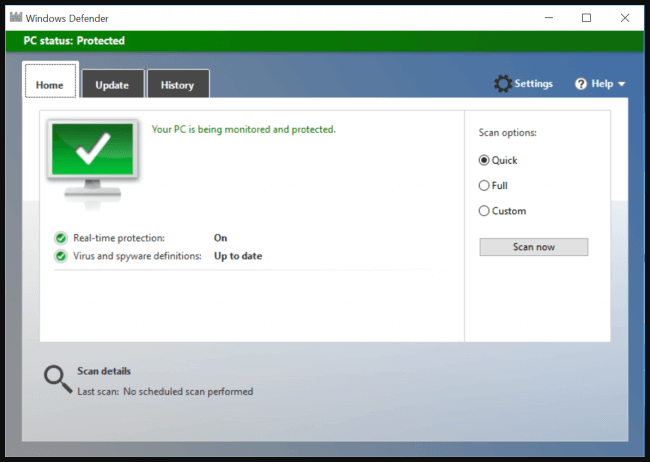

- HOW TO TURN OFF ANTIVIRUS WINDOWS 10 PRO HOW TO
- HOW TO TURN OFF ANTIVIRUS WINDOWS 10 PRO INSTALL
- HOW TO TURN OFF ANTIVIRUS WINDOWS 10 PRO UPDATE
- HOW TO TURN OFF ANTIVIRUS WINDOWS 10 PRO PRO
- HOW TO TURN OFF ANTIVIRUS WINDOWS 10 PRO PC
When you install some 3rd party antivirus (AV) programs, they may automatically turn off Microsoft Defender Antivirus. You must be signed in as an administrator to be able to turn on or off Microsoft Defender Antivirus.
HOW TO TURN OFF ANTIVIRUS WINDOWS 10 PRO HOW TO
This tutorial will show you how to completely turn on or off Microsoft Defender Antivirus for all users in Windows 10.
HOW TO TURN OFF ANTIVIRUS WINDOWS 10 PRO PC
Malware can infect your PC without your knowledge: it might install itself from an email message, when you connect to the Internet, or when you install certain apps using a USB flash drive, CD, DVD, or other removable media. Microsoft Defender Antivirus helps protect your PC against malware (malicious software) like viruses, spyware, and other potentially unwanted software. This includes updates related to keeping Microsoft Defender Antivirus up to date.

Behavior-based, heuristic, and real-time antivirus protection.Next-generation protection services include the following: Next-generation protection brings together machine learning, big-data analysis, in-depth threat resistance research, and the Microsoft cloud infrastructure to protect devices in your enterprise organization. Microsoft Defender Antivirus is the next-generation protection component of Microsoft Defender Advanced Threat Protection (Microsoft Defender ATP). In addition to this real-time protection, updates are downloaded automatically to help keep your device safe and protect it from threats. Windows Security continually scans for malware (malicious software), viruses, and security threats. Your device will be actively protected from the moment you start Windows 10. Windows 10 includes Windows Security, which provides the latest antivirus protection. Starting with Windows 10 version 2004, Windows Defender Antivirus as been renamed to Microsoft Defender Antivirus.
HOW TO TURN OFF ANTIVIRUS WINDOWS 10 PRO UPDATE
This update will be rolled out to devices running Windows Enterprise E3 and E5 at a future date. 8 and higher (see KB4052623 for details). Intended to be used by OEMs and IT admins to disable Microsoft Defender Antivirus for the purpose of deploying another antivirus product during deployment, DisableAntiSpyware is not applicable to consumer devices and will be removed beginning with Microsoft Defender Antimalware platform versions. As Microsoft Defender antivirus automatically turns itself off when it detects another antivirus program, we are removing a legacy registry setting called DisableAntiSpyware. This feature protects devices from cyber attacks that try to disable built-security solutions, such as antivirus protection, in an attempt to gain access to your data, to install malware, or to otherwise exploit your data, identity, and devices. UPDATE : Microsoft Defender Antivirus tamper protection is turned on by default for all consumer Windows 10 devices. This change does not impact third party antivirus connections to the Windows Security app. The impact of the DisableAntiSpyware removal is limited to Windows 10 versions prior to 1903 using Microsoft Defender Antivirus.
HOW TO TURN OFF ANTIVIRUS WINDOWS 10 PRO PRO
Tamper protection is available in all Home and Pro editions of Windows 10 version 1903 and higher and is enabled by default. Note that this setting is protected by tamper protection.

Enterprise E3 and E5 editions will be released at a future date. This change is included with Microsoft Defender Antimalware platform versions. This setting is not intended for consumer devices, and we’ve decided to remove this registry key. This is a legacy setting that is no longer necessary as Microsoft Defender antivirus automatically turns itself off when it detects another antivirus program. How to Turn On or Off Microsoft Defender Antivirus in Windows 10ĭisableAntiSpyware is intended to be used by OEMs and IT Pros to disable Microsoft Defender Antivirus and deploy another antivirus product during deployment.


 0 kommentar(er)
0 kommentar(er)
